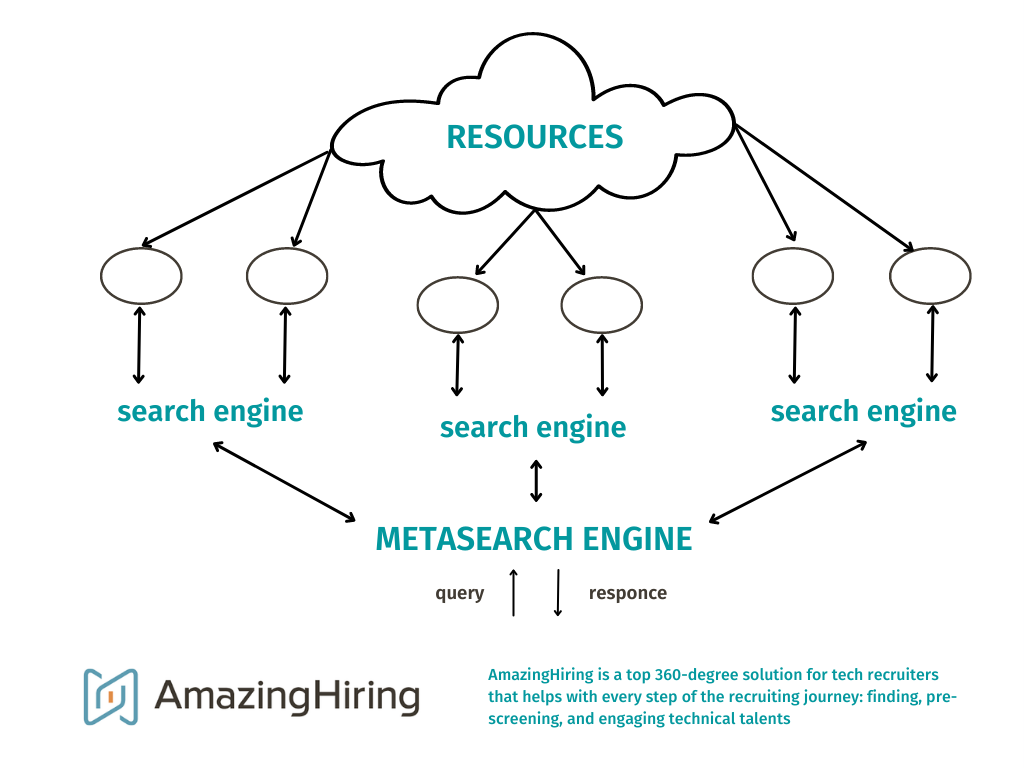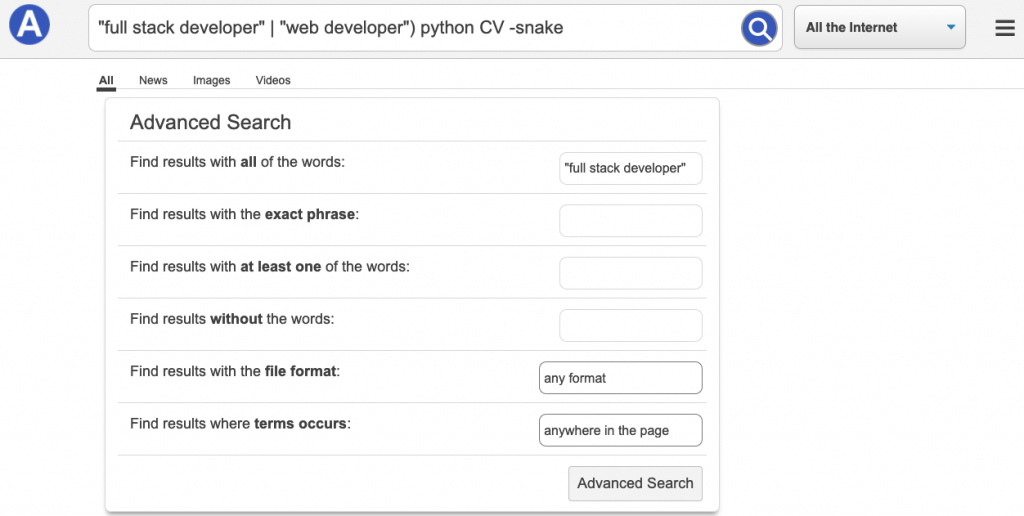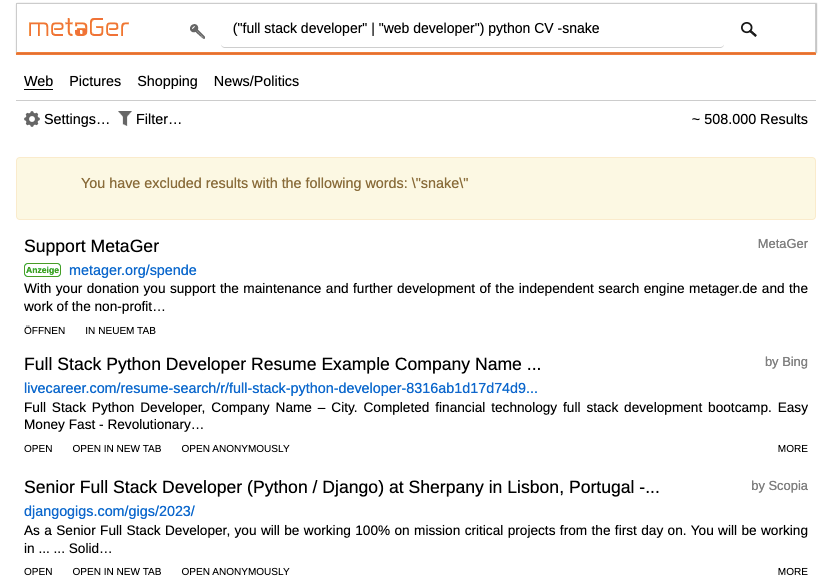Сontents
It is no secret that most recruiters source candidates only on LinkedIn. Some of them use Boolean to find professionals who do not update or do not even have their social profiles at all. The next step forward here is to use metasearch engines to cover more sources and, thus, get more results.
Metasearch Engines for Sourcing
Metasearch engines are search tools that index multiple search engines and databases simultaneously to show aggregated results from different sources in a single list.
The problem is that search engines differ in many ways (e.g. search facilities, scraped sources). The overlap level among them is relatively small. Therefore, using metasearch engines for sourcing might be more beneficial — mostly, due to a wider result range compared to what a single search engine might provide.
In this article, we will compare different metasearch engines in terms of candidate sourcing, and show how you can use them to find more candidates.
We will use some Boolean logic while creating search queries. In order to learn more about the X-ray search basics, check out our recent article “X-ray Search: How to Source Using Google and Other Platforms“.
For the sake of integrity, we will run a single search query in Google and several metasearch engines to find out how the results from its first pages would differ.
Our experimental Boolean string will target CVs of full-stack developers (or web developers) with knowledge of Python. In order to mitigate irrelevant results, let us exclude the word “snake” using the minus sign (same as NOT operator):
(“full stack developer” | “web developer”) python CV -snake
Since all roads lead to Google, this is where we will start.
When entering our Boolean string in the Google search bar, it delivers about 1.140.000 results.
If we screen its first page, besides 3 Google Ads, we will find the following search sources:
- hireitpeople.com;
- livecareer.com;
- enhancv.com;
- Interviewbit.com;
- resumeworded.com;
- resumegiants.com;
- zety.com.
Now, let us compare Google results with what sourcing on alternative and metasearch engines brings us.
Dogpile
Dogpile is a metasearch engine that allows its users to retrieve information from the WWW. It indexes major search engines like Google, Bing, Yandex, Yahoo! and others.
The first 4 results Dogpile provides us are Ads. Below them, we can find the result list that includes the following resources:
- livecareer.com;
- pythonistaplanet.com;
- hireitpeople.com;
- wikajobs.com;
- zety.com;
- dev.to;
- mygreatlearning.com;
- jobscontact.cz;
- jooble.org.
Dogpile users can customise the default search settings in preferences. That will help filter potentially explicit content and track and display recent searches.
What is more important, half of the sources we can find on Dogpile differ from what Google delivers.
Startpage
Startpage is known as the world’s most private search engine. It delivers Google search results without collecting, tracking, and targeting user data.
Here the results page shows 3 Ads and below them, there are links to the following resources:
- hireitpeople.com;
- livecareer.com;
- enhancv.com;
- resumeworded.com;
- resumegiants.com;
- zety.com;
- qwikresume.com;
- indeed.com.
Since Startpage scrapes Google databases, most of their sources tend to overlap. Though some of the results differ from those on Google.
Moreover, Startpage provides its users with advanced search settings. For instance, they can turn on the family filter, specify the region filter, set safety and privacy preferences, etc.
#1 Playbook: The Ultimate Guide to Sourcing on Social Media
Subscribe to AmazingHiring’s sourcing newsletter and get the #1 Playbook: The Ultimate Guide to Sourcing on Social Media
All the Internet
All the Internet is a metasearch engine focused on privacy. It provides results indexed from a wide range of search engines along with customizable user options.
The top 5 results show Ads, followed by the web-results from:
- hireitpeople.com;
- zety.com;
- resumeworded.com;
- interviewbit.com;
- enhancv.com;
- glasweld.se;
- resume-example.com;
- lesovoz.by;
- cakeresume.com
- monster.se;
- cv.ee;
- qwikresume.com;
- livecareer.com.
Some of the sources the metasearch engine presents match with the ones from Google. However, there are some new results that users might find interesting. “Advanced Search” feature would be especially helpful for novice sourcers:
MetaGer
MetaGer is another metasearch engine with a focus on user privacy and neutral results.
The only Ad presented on MetaGer refers to the engine itself. Other results come from:
- livecareer.com;
- djangogigs.com;
- qwikresume.com;
- enhancv.com;
- myminifactory.com;
- hireitpeople.com;
- indeed.com;
- softwarecornwall.org;
- resumegenius.com;
- correctiv.org;
- myperfectresume.com;
- resumeworded.com;
- espresso-jobs.com;
- mintresume.com;
- 9newjob.com;
- etc.
MetaGer provides about 508.000 results and shows what search engine has delivered the information. Only a few sources match the ones found on Google and the results also include people’s professional web pages with resumes and CVs.
Users can set the search filters: safe search, date, language, blacklist, appearance.
Qwant
Qwant is an independent search engine with neutral access to the whole web.
The first page starts with 3 Ads on the top and shows web-results from:
- livecareer.com;
- resumegenius.com;
- pythonistaplanet.com;
- zety.com;
- dev.to;
- quora.com;
- reddit.com;
- monsterindia.com.
Surprisingly, some of the results seem irrelevant, though there are a few sources similar to the ones from Google. Search settings allow users to customise the location, data freshness, adult filter, display mode, and trends.
Disadvantages of using Metasearch Engines for Sourcing
When it comes to finding more fresh data, sourcing on metasearch engines has proven to be efficient. However, nothing is perfect and metasearch engines, like any tools, have their specifics.
First of all, they might be of little use for skilled sourcers. The thing is that metasearch engines usually process basic syntax and are great for relatively simple queries. For example, Google or Bing understand complicated search strings and complex Boolean queries much better.
In addition, access to less-well-known engines should lead to a seemingly greater amount of data. However, in most cases metasearch engines bring the same or even fewer results than some major engines. Not to mention that sponsored content and features are still there.
 Finding this article insightful?
Top Recruiters create content for AmazingHiring.
Subscribe to receive 1 curated newsletter per month with our latest blog posts.
Finding this article insightful?
Top Recruiters create content for AmazingHiring.
Subscribe to receive 1 curated newsletter per month with our latest blog posts.
Conclusion
Sourcing on metasearch engines might become your new great toolkit. Or a nonstarter. That is up to you. What is clear is that metasearching allows users to enrich the search coverage and find some hidden gems.
Thanks to the wider access to the web data, metasearch engines might be super useful for sourcing as they deliver more fresh results. This alone makes the method worth trying out. And indeed, what is easier than just googling not on Google?
If you want to improve your sourcing by cutting the time spent on finding candidates’ contact info and learning about their professional background — simply request a demo of AmazingHiring (if you haven’t yet), and we’ll take care of that!

80% of Tech candidates are passive.
Level up your outbound sourcing strategy.#1 Playbook: The Ultimate Guide to Sourcing on Social Media
Subscribe to AmazingHiring’s sourcing newsletter and get the #1 Playbook: The Ultimate Guide to Sourcing on Social Media
Hiring the right employees can elevate your business to new standards. But finding the right employees or candidates is not always easy. Many applicants have vast experiences and backgrounds, but not all may fit well within your company. This is why you need a tech recruiting strategy to cut through the noise and find the […]
In this blog post, we have gathered a list of books for recruiters, HRs, and anyone interested in building the company culture and work relationships. We hope you will find it useful. Enjoy the reading! Books that Every Recruiter Should Read Lou Adler’s Books As a recruiter, you must have heard Lou Adler’s name a […]
Social media sites are valuable sources of information for any recruiter. This is especially handy when you have to navigate in a highly competitive niche like software development. There is a massive shortage of talent in this space so that to find and hire the right candidate, you have to be very fast, proactive, and […]













